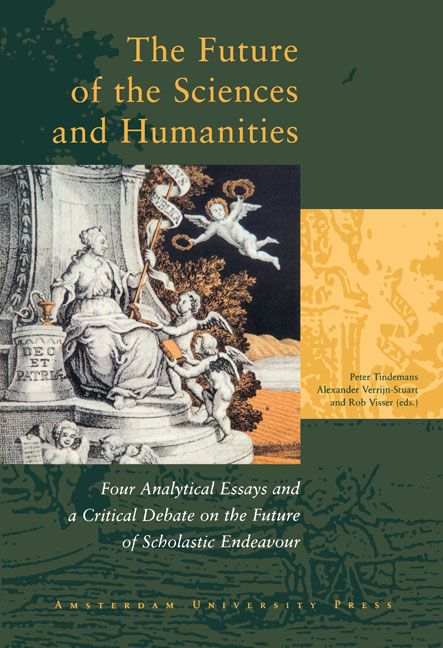 The Future of the Sciences and Humanities
The Future of the Sciences and Humanities Book contents
- Frontmatter
- Preface
- Contents
- 1 The Sciences and Arts Debate A review and some conclusions
- 2 Historical and Structural Approaches in the Natural and Human Sciences .
- The Role of Laws and Contingency in History
- 3 Science and Society in Flux
- Does A New Kind of Science Require a New Kind of Scholar or a New Kind of University?
- 4 Science for the 21st Century
- Redrawing Disciplinar Boundaries – but to What Degree?
- 5 Science and Democracy
- Science and Democracy: a Difficult Relationship: ‘An enlightened and elitist essay on an unresolvable problem’
- 6 Epilogue
- 7 Appendix
5 - Science and Democracy
Published online by Cambridge University Press: 03 February 2021
- Frontmatter
- Preface
- Contents
- 1 The Sciences and Arts Debate A review and some conclusions
- 2 Historical and Structural Approaches in the Natural and Human Sciences .
- The Role of Laws and Contingency in History
- 3 Science and Society in Flux
- Does A New Kind of Science Require a New Kind of Scholar or a New Kind of University?
- 4 Science for the 21st Century
- Redrawing Disciplinar Boundaries – but to What Degree?
- 5 Science and Democracy
- Science and Democracy: a Difficult Relationship: ‘An enlightened and elitist essay on an unresolvable problem’
- 6 Epilogue
- 7 Appendix
Summary
ABSTRACT. From the seventeenth century onwards, there has been a spectacular growth of scientific knowledge. Should we expect this growth to continue at the same pace? Would that be possible without an equally spectacular increase in expenditure? How should politicians in a democratic state rationally determine the appropriate level of public investment in scientific research? This prize essay provides tentative answers to these burning issues.
In Section One, an attempt is made to characterise at a meta-level all branches of science and scholarship, not individually, but collectively. Epistemic growth turns out to be an essential characteristic of science. In Section Two, the growth of science is analysed from a historical perspective. What are the prospects of scientific growth in a saturation economy of science? Possible opportunities for, and obstacles to, the future growth of science are explored. The third section is concerned with the rationality of investments in science. Pertinent issues are discussed within the conceptual framework of rational decision theory. What kinds of benefits from science should we distinguish, and how should we value them? Is it possible to predict specific outcomes of investments in research? If this is not feasible, how can it be rational to invest in scientific research at all? The traditional “public good” justification for state investments in basic research turns out to be defective. Are we able to give a better justification? And if so, with which model of rationality can we determine the right level of investments in a specific country? By way of an example, the Dutch policy with regard to publicly funded research is analysed. Finally, it is argued that there is an intrinsic relation between democracy and the scientific attitude. Democracies function better to the extent that voters and politicians make up their minds according to minimal standards of scientific rationality.
INTRODUCTION
The oldest learned society in The Netherlands, the Hollandsche Maatschappij der Wetenschappen, was founded on 21 May 1752 in the city of Haarlem. According to the preamble to its first proceedings, it came into existence because some citizens sought entertainment in performing, imitating, and discussing scientific experiments. Headed by the Lutheran minister Van der Aa, they had formed a small scientific collegium, which now obtained official status, consciously imitating “in the Netherlands the admirable diligence of other Kingdoms and Republics in their support and encouragement of the Sciences and Arts”.
- Type
- Chapter
- Information
- The Future of the Sciences and HumanitiesFour Analytical Essays and a Critical Debate on the Future of Scholastic Endeavor, pp. 153 - 220Publisher: Amsterdam University PressPrint publication year: 2002


